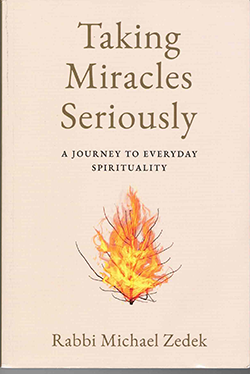Taking Miracles Seriously: A Journey to Everyday Spirituality by Rabbi Michael Zedek; Toronto, Canada: Sutherland House © 2023; ISBN 9781990-823121; 165 pages including appendix, acknowledgments and notes, $19.95.

 SAN DIEGO – The author, Rabbi Zedek, lives in Kansas but often traverses portions of San Diego County on his way to Rancho La Puerta, the nearby spa and spirituality retreat in Tecate, Baja California, operated by the family of San Diegan Deborah Szekely. He regularly delivers inspirational talks there filled with sage words from poets, television scripts, cartoon strips, and himself about finding the sacred in what mistakenly is believed to be mundane.
SAN DIEGO – The author, Rabbi Zedek, lives in Kansas but often traverses portions of San Diego County on his way to Rancho La Puerta, the nearby spa and spirituality retreat in Tecate, Baja California, operated by the family of San Diegan Deborah Szekely. He regularly delivers inspirational talks there filled with sage words from poets, television scripts, cartoon strips, and himself about finding the sacred in what mistakenly is believed to be mundane.
As fascinating as the quotations from other sources are, the personal stories told from Rabbi Zedek’s own experiences were the ones that most resonated with me as I read this slim volume. Perhaps this is because I know from personal experience that we can intellectually quote from the works of others without taking their meanings deep into our hearts, but when we relate our own experiences, we are telling about something that in the everyday course of living made us take special notice.
One story recalled an experience he had as a newly minted rabbi. After study sessions with Rabbi Gershon Hadas, z”l, the two of them would chat informally over tea. One day, Rabbi Hadas asked Zedek when one should say the shehekeyanu prayer. Confidently, Zedek responded that prayer is said whenever one experiences something new or upon the first day of a holy day. Of course, that was a textbook answer learned in seminary. But Rabbi Hadas was unsatisfied. He suggested the true answer is that if one takes the time to really notice—in the modern vernacular, if one truly practices mindfulness—then every moment is new, and therefore the prayer is appropriate at any or every moment.
I was reminded of the story of the Orthodox Jewish astronaut who returned from a mission making multiple orbits each day around the earth. “It was exhausting,” he sighed. “Tefillin on, tefillin off, tefillin on ..”
In another personal story, Zedek told of encountering two female patients at a hospital where he served as a chaplain. The first woman had broken her leg and arm. This lady’s face “seemed marinated in rage,” the rabbi wrote. She was mad at the doctors, the nurses, at God, and, as he entered her room for the first time, mad at the rabbi. The second patient he visited was a woman who had been paralyzed from the neck down. She smiled as the rabbi entered the room. Physically far worse off than the first patient, “this person knew that she still could shape some part of her destiny by how she played her hand,” Rabbi Zedek wrote. “So, she continued to connect with beauty, caring, and uplift. She embraced the conviction that life, with all its challenges and limitations, was worth it. She made an unforgettable difference in my life and, not surprisingly, many others.”
Any wonder which patient would find many occasions to recite the shehekeyanu prayer?
Zedek’s book, like all of Gaul, is divided into three main parts. The first part concerned taking miracles seriously, that is, the miracles of the ordinary; second, taking God seriously; and last, taking prayer and poetry seriously. One important lesson Zedek imparts about God is that the Divine can lodge within us; that when we do good deeds, God’s Light shines through us. Zedek cites the life of Nelson Mandela. In the Sotho language there is a concept called seriti, meaning “the shadow you cast.” Mandela, who had been imprisoned for 28 years by South Africa’s apartheid regime, believed that “how I treat others is independent of their treatment of me. Whether or not they have earned or deserve some kindness, I will be compassionate.”
“We are the context or vehicle by which God awareness becomes present, manifest, and real,” Zedek teaches.
Unfortunately, he rues, “we are so often blind to the essential teaching that not only are miracles always present, but also the overwhelming miracle of a divine presence resides in us and is always available to us.”
*
Donald H. Harrison is editor emeritus of San Diego Jewish World. He may be contacted via donald.harrison@sdjewishworld.com
Mr. Harrison,
Thank you for this lovely review of a book I plan to buy. The Gershon Hadas referred to was my late father Moses Hadas’s older brother.